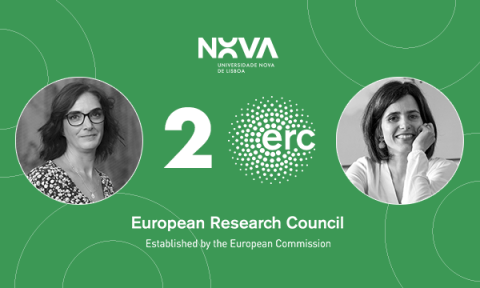
Elvira Fortunato and Cecília Roque, both professors and researchers at NOVA School of Science and Technology, have been awarded two Proof of Concept grants from the European Research Council (ERC), the most reputable institution for granting funds for scientific and technological research in Europe.
NOVA University Lisbon thus reinforces its position in terms of the number of ERC grants, going from 22 to 24 in total.
The ERC awarded a total of 166 Proof of Concept grants – each worth €150,000 – to European researchers. Four of these grants came to Portugal – and half for projects that were born at FCT NOVA.
Reducing electronic waste
The project led by Elvira Fortunato, professor, researcher and director of CENIMAT|i3N, is called e-GREEN: From forest to electronics: green graphene and arises as a response to the increase in electronic waste, which is already the waste stream with greater growth, accumulating 250 million tons per year. A new sustainable approach, both in terms of materials and processes, is the proposal: “The e-GREEN project aims at the direct formation of 3D patterns based on graphene for the formation of printed circuits on flexible recyclable substrates, avoiding the need to use scarce and non-ecological metallic materials in addition to expensive, polluting and time-consuming processes”, says Elvira Fortunato.
The e-GREEN project follows on from another project awarded with an ERC grant, DIGISMART (Multifunctional Digital Materials Platform for Smart Integrated Applications) whose objective is to revolutionize the way in which integrated circuits and electronic components are produced, using 'eco-friendly' materials. It was through DIGISMART that it was possible “to obtain a wide variety of materials based on graphene, materials that are of renewable origin - such as cellulose, nanocellulose and cork - using a new process based on graphene induced by laser. This method has emerged as a promising approach due to its multifunctionality, cost-effectiveness, process, scalability, simplicity, high efficiency and good reproducibility.”
The objective of e-GREEN is to develop a proof of concept based on several prototypes in order to evaluate electrical performances and carry out an extensive market analysis. The technological process will open new doors for sustainable electronics.
Surveilling cancer
Led by Cecília Roque, associate professor and Principal Investigator at the Biomolecular Engineering Laboratory of the Applied Biomolecular Sciences Unit (UCIBIO), the ENSURE project: Non-invasive follow-up of urinary tract cancers consists on the creation of an innovative bladder cancer surveillance method, non-invasive, rapid and low-cost – making use of “electronic nose” technology developed in a previous ERC grant awarded to the researcher (SCENT: Hybrid Gels for Rapid Microbial Detection). This electronic nose includes sustainable materials sensitive to gases, and a device that uses artificial intelligence algorithms to distinguish a set of odors. Based on this technology and on the team's preliminary results, the foundations are laid for clinical application in the diagnosis and follow-up of patients: “Our main objective is to drastically reduce the number of times patients have to undergo invasive and painful techniques ”, explains Cecília Roque.
With 573,000 new cases and 213,000 deaths in 2020, bladder cancer is the most common in the urinary system and has the highest cost per patient among all cancers, which is mainly due to demanding surveillance that uses invasive techniques to the patient. The project undertakes to assess the technological and business feasibility in a synergy between Cecília Roque's work team and the Italian company Day One, a collaboration complemented by close contact with other employees and stakeholders.
ERC Proof of Concept grants
Elvira Fortunato thus accumulates her third ERC scholarship and Cecília Roque her second; with projects in the areas of sustainability and health, respectively.
Both grants are Proof of Concept which means they are awarded to researchers who have already been distinguished with an an ERC grant. It also means that researchers must use the funding to move from theory to practice: imagining the feasibility of developing scientific concepts as well as exploring business opportunities or preparing patent applications.
Among the 166 researchers distinguished with these grants, the majority (92) are women. The grants were awarded to researchers from Austria (7 grants), Belgium (5), Czech Republic (1), Cyprus (1), Denmark (4), Germany (13), Greece (1), Finland (3), France ( 15), Iceland (1), Ireland (6), Israel (18), Italy (21), Luxembourg (1), Netherlands (16), Norway (1), Portugal (4), Slovenia (1), Spain ( 18), Sweden (7) and the United Kingdom (22).